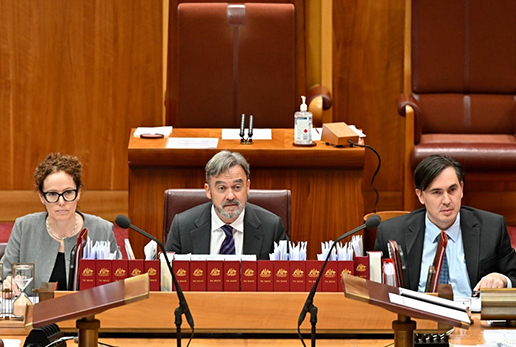Parliamentary duties
The Deputy President is the President's deputy and takes the chair in the Senate whenever requested to do so by the President. The Deputy President supports the President in interpreting and applying the standing orders and maintaining order under standing order 184(1). The President and Deputy President are also supported by a number of 'temporary chairs of committees' who are nominated by warrant of the President. When in the chair, temporary chairs are referred to as 'Acting Deputy President'. Although this panel is formally nominated by the President, in practice arrangements for the panel are overseen by the Deputy President.
The Deputy President in the capacity of Chair of Committees is the presiding officer in committee of the whole, presiding over the chamber whenever a committee of the whole Senate is constituted (and relieved by temporary chairs from time to time). The committee of the whole is formed for several purposes, but primarily for the detailed examination of bills. To enable the effective scrutiny of bills, proceedings in committee of the whole are free-ranging, with senators able to contribute to debate numerous times, ask detailed questions of ministers and move and discuss amendments. The Deputy President facilitates the orderly conduct of this exchange of contributions, questions and proposals to amend bills, particularly during complex committee proceedings. The composition of the committee is the same as that of the Senate.

Senator Andrew McLachlan CSC, Deputy President of the Senate, presiding during committee of the whole, supported by clerks who provide procedural advice
When the committee is formed, the President leaves the President's chair, and the Chair of Committees takes the chair at the table below, between the Clerk and the Deputy Clerk. The location of the chair at the table in committee facilitates receipt of advice from the clerks on matters which may be complex, facilitates communication with senators, and provides a visual signal that the Senate is in committee and that different rules apply to the proceedings.
If the Chair of Committees is absent during a committee of the whole, any one of the temporary chairs of Committees may take the chair.
The Deputy President and Chair of Committees exercises the same authority when presiding in the Senate or in committee of the whole as the President, but any disorder in the committee of the whole may be dealt with only by the Senate, on receiving a report from the Chair.
The Deputy President must not remain in the chair of the Senate after the President enters the chamber. When the President is in the chamber the President must be in the chair (except in committee of the whole), and cannot, in order to take part in debate in the Senate, put the Deputy President in the chair. On the same principle, the Deputy President must be in the chair, as 'Chair of Committees', if they come into the chamber during committee of the whole proceedings. Thus, while the Deputy President can relieve the President in the chair of the Senate, the President cannot relieve the Deputy President in committee of the whole. The Deputy President has a seat on the chamber floor and contributes to debate in proceedings other than committee of the whole from this seat.
Like the President, the Deputy President and Chair of Committees is entitled to vote in all cases (standing order 99) and also has a discretion not to vote when in the chair (standing order 101). In practice this applies to all temporary chairs when they are in the chair and reflects the fact that, unlike other senators, the person in the chair cannot exercise a right not to vote by staying away from or leaving the chamber.
The Deputy President is, ex officio, the Chair of the Standing Committee on Procedure, which examines the procedures of the Senate and recommends to the Senate changes in procedures, where appropriate (standing order 19). In practice the Deputy President is also a member and the Deputy Chair of the Standing Committee on Appropriations, Staffing and Security.
The Deputy President is also chair of the Chair's Committee (standing order 25(1)), which may consider and report to the Senate on any matter relating to the operations of legislation and reference committees and Senate select committees. In this capacity, the Deputy President also provides leadership and guidance to the numerous chairs of Senate committees – 16 chairs of the legislative and reference committees and chairs of any select committees – who are comprised of senators from all party groupings. The Deputy President sets expectations for the management of committee proceedings by committee chairs, particularly in relation to chairing hearings at which witnesses appear.